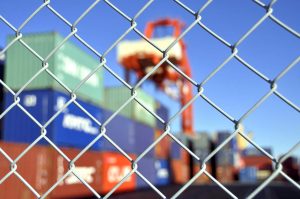Brexit – the ‘elephant in the room’

Brexit is the ‘elephant in the room’ for business.
Possibly, the latest edition of the Irish Wine Market Report 2018 was not exaggerating when it stated that the combined threat of an excise increase on wine in Budget 2020 and a ‘no-deal’ Brexit present “a clear and present danger for Ireland’s wine importers”.
For alongside this, a statement from the Drinks Industry Group of Ireland claimed that the hospitality industry stands to lose up to 10,000 jobs in the Republic in the event of a no-deal Brexit.
A serious concern to all businesses that trade with the UK, one would think.
Yet despite this sword of Damocles hanging above such businesses, research by InterTradeIreland – a provider of cross-border services for Small- and Medium-Sized Enterprises – recently revealed that over half of the 760 businesses it surveyed along the north/south divide are ‘unprepared’ for a hard Brexit.
The potential for losses induced by any fall in Sterling’s value notwithstanding, InterTrade’s Business Monitor for Q2 2019 found that while Brexit looms large in the background, most firms have opted to pay no attention to its potential impact; just six per cent of cross-border traders reckon they’re prepared for the cashflow and liquidity issues that will arise in the event of a no-deal Brexit.
InterTradeIreland’s Monitor found that 82% of cross-border traders – those who’re most exposed in the event of a no-deal – have simply not prepared for such an outcome. Indeed, only 14% of businesses that trade cross-border have examined the potential impact of Customs activity while just 12% have looked at the effect of tariffs.
There’s concern too that failure to remove the uncertainty surrounding Brexit is exposing businesses to more problems in the longer term.
Dealing with Brexit is by far the biggest cause of this uncertain outlook. 45% of businesses overall – and almost 60% of manufacturing firms – record Brexit as the key issue they face, yet only six per cent have examined the possible legal implications on business contracts if the UK leaves the EU with no deal in place.

“Ignoring Brexit is a bigger issue than not preparing for it”
A no-deal Brexit poses numerous problems for Irish importers and exporters to and from the UK: potential customs delays, currency fluctuations, supply chain issues, tariffs, changes in regulations and access restrictions to the UK and EU markets figure among the main headaches.
InterTradeIreland recently launched a new campaign to encourage cross-border traders to plan for Brexit. Its research underlined the need for such companies to start acting now.
“Ignoring Brexit is a bigger issue than not preparing for it,” claimed Aidan Gough, InterTradeIreland’s Designated Officer and Director of Strategy and Policy, “We want to reach as many SMEs as possible to help them prepare; that’s why InterTradeIreland is launching our new campaign.
“This will be a significant departure for InterTradeIreland,” he continued, “It recognises that Brexit is the ‘elephant in the room’ and with the deadline of October 31st fast approaching, Brexit is now just too big to brush under the carpet.
InterTradeIreland’s research shows continuity of supply as an additional problem that could hinder cross-border businesses and the ability to trade, but less than one in 10 have taken steps to interrogate their supply chain.
The Monitor highlights the fact that just 12% of SMEs trading across the border have looked at the possible impact of extra taxes on their business while some companies have taken tentative steps such as squirrelling away funding to allow for any extra upfront costs brought on by a no-deal Brexit.
And the outlook for companies which use the UK as a land bridge for products going into Europe seems scarcely much brighter.
Importers & distributors eye the ‘elephant’
What have the major importers, wholesalers and distributors to the drinks trade here been doing in advance of October 31st?
How will they answer the Christmas consumer callout for wine, spirits and beer should a ‘no-deal’ Brexit come into being?
We spoke to a few of them to shed some light on their ‘no deal’ plans for the Christmas market.
Britvic Ireland, for example, has confirmed that it is stocking up on raw materials and finished goods in the event of supply chain disruption from a disorderly or no-deal Brexit.
So too is Heineken Ireland which has been working closely with suppliers and partners to ensure business continuity from both a supply chain and trading perspective.
Heineken Ireland told Drinks Industry Ireland, “Heineken have built a solid stock of finished goods and raw materials to enable us withstand whatever outcome may arise on Oct 31st.
“From an ability to trade point-of-view, we have the necessary processes in place to ensure that we can meet customs requirements and successfully import as required. We’re confident to continue business as normal for our customers and consumers post-Brexit.”
Similarly, Diageo states that it is “well-placed to respond to the possible scenarios that we may face over the coming months but we urge all parties to work together to ensure a period of much-needed stability for business. This will enable companies like Diageo to continue to invest, supporting hundreds of thousands of jobs in farming, manufacturing, tourism and hospitality.”
Importing wine, spirits and beer from near
Importers and distributors like Barry & Fitzwilliam, have been listening to the advice meted out by the Alcohol Beverage Federation of Ireland.
“We’ve also been talking to customers as to how we’re going to work this,” Kevin O’Mahony, Commercial Director at the wine, spirits and beer importer and distributor, told Drinks Industry Ireland, “We’re really monitoring the situation on a day-to-day basis in terms of updates as they come through.
“What we can do is take sensible actions such as working with the brand owners, particularly the UK-based ones, to bring in stock in advance of October 31st.”
Thus companies such as BrewDog, Whyte & Mackay and McGuigan are in touch with B&F, working with it to find short-term solutions to the end of the year.
“We’ve been working on cashflow too as we’ve got to get these products into the country two or three months earlier than normal for Christmas,” says Kevin, “BrewDog bought a brewery in Germany and so we could use this, but we’re all still trying to understand what WTO tariffs will look like in a hard Brexit.
“Our understanding is that Country of Origin is the key,” he continued, “Australian wine bottled in the UK won’t have a WTO tariff as we understand it as Country of Origin is Australia rather than the UK, but that doesn’t mean there won’t be delays and checks.”
The majority of wine imported by Gilbeys with Bibendum comes deep sea from Chile and Argentina.
“We also take deep sea deliveries from Australia, New Zealand and South Africa,” explains Duncan Millar, Sales Director with the wine importing company, “Our biggest purchase ex-UK is [yellowtail] which accounts for around 15% of our total supply.”
Gilbeys with Bibendum has increased its warehousing capability and on key lines it has arranged for four to eight weeks’ extra stock.
While companies like Barry & Fitzwilliam have stocked up in a similar fashion, this option might not be available to smaller outfits.
Kevin O’Mahony understands that there are companies frantically looking for warehousing space at the moment to try and get somewhere to stockpile supplies.
As a result, one might envisage that upfront costs such as stocking up so far in advance of Christmas would be the harbinger of a rise in prices.
But all seems calm on that front.
“There are obviously increased costs in holding additional stocks” pointed out Duncan Millar, “however currently we’re not anticipating a price increase pre-Christmas.”
Of the importers and distributors that Drinks Industry Ireland spoke to, few are fooled. And certainly none are oblivious to the challenges.
“We know that there will be issues post 31st October if Brexit happens on that date” said Duncan Millar, “but we’ve been working to try to minimise the impacts. The biggest issue still remains the degree of uncertainty.”
That and the cross-border supply movement problems envisaged alongside the congestion at Irish ports, he added.
And what happens to goods in bond after the 31st of October?
As far as Kevin O’Mahony can tell, once it’s through the port it’s cleared from that point-of-view whether it’s duty-paid or still in bond.
Whatever happens, the Government should bear in mind that a no-deal Brexit will not only hurt businesses on this island, it will hurt the Exchequer too with IBEC’s Chief Economist Gerard Brady estimating that a no-deal Brexit could mean the Exchequer losing €180 million.
That’s nothing compared to what the rest of the drinks industry could lose.

The majority of wine imported by Gilbeys with Bibendum comes deep sea from Chile and Argentina.








